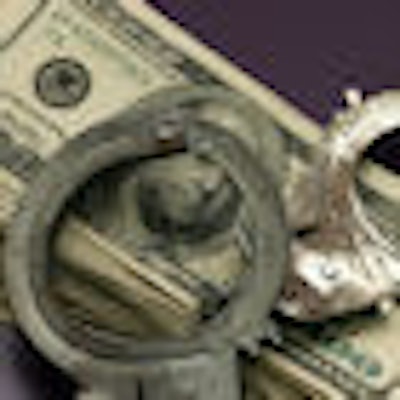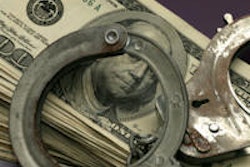
Sometimes it's a spouse, girlfriend, relative, accountant, or business partner.
Unfortunately, more often it's a trusted, longtime employee who has an insider's knowledge of your bookkeeping practices and access to your bank account.
Maybe their spouse has been out of work for months and, desperate for money, they begin embezzling from the practice and "cooking the books" to cover their tracks.
But experts say it is often just a matter of greed.
Dental practice embezzlement is not an anomaly; in fact, it's shockingly pervasive. Some fraud investigators say that 60% of dentists will be victims of fraud during their careers, while others put the figure as high as 90%.
Even Gordon Christensen, DDS, MSD, PhD, and his wife Rella Christensen, RDH, PhD, have been victimized -- not once, but twice -- by employees who stole from their nonprofit research group, CRA, now called the Clinicians Report.
"It's often the most trusted employee," he told DrBicuspid.com.
The first theft involved a woman accountant who seemed extraordinarily dedicated to her job: She came in early and left late. She was also intent on being the only one in the office who made financial entries. She was eventually discovered after the office's door activator recorded her coming into the office at 3 a.m.
— Gordon Christensen, DDS, MSD, PhD
"She was rigging the numbers and embezzling an enormous amount," Dr. Christensen said. CRA took the case to a state job court, where the bookkeeper/accountant somehow twice avoided being held responsible. Finally Rella filed a civil lawsuit against her and won, but the situation took a toll on the Christensens -- especially after the accountant's husband, who worked for an explosives company, threatened them and even tried to run down Rella with his SUV.
"We did win, but I don't know if it was worth it," Dr. Christensen recalled. "The endeavor cost many thousands of dollars and lots of time, effort, energy, worry, and grief."
The second embezzlement involved a young man, a former missionary, who was responsible for depositing funds from German subscriptions for the Christensens' research group into German banks.
Despite growing subscription levels, revenue was mysteriously going down, which made Rella suspicious. The Christensens eventually discovered that he had embezzled more than $200,000 over several years.
"At first it was deny, deny, deny," Dr. Christensen said. "He finally admitted it and brought his parents in, who apologized and wanted to repay the money."
While many embezzlers involve people who've had a run of bad luck, these individuals had no extenuating circumstances that motivated them to steal.
"It was simple greed," Dr. Christensen said. "It's just appalling that people do this."
Should you prosecute?
David Harris, who runs dental fraud investigation company Prosperident, investigates up to 100 dental fraud cases per year using four forensic examiners, but he says he could keep 15 inspectors busy. In the U.S., 5,000 to 6,000 dentists per year will be fraud victims, he told DrBicuspid.com.
"It's just so endemic in dentistry," he said.
Most embezzlers steal about $100,000, but Harris said the biggest theft he's uncovered totaled $612,000. Insurance only covers so much. Most policies have a fraud coverage maximum of $75,000, he said, adding that some dentists have no insurance to cover thefts.
Office managers, receptionists, and anyone with front desk access are usually the culprits, Harris noted, and the majority of frauds are committed by people who've been with the practice more than five years.
Often, normally honest people are driven by desperate circumstances to steal from their employers, he said.
"Something happens that puts their back to the wall," Harris explained. "A spouse loses their job or dies, or narcotics or gambling problems threaten their basic financial existence."
Only about 20% of dentists prosecute the embezzlers, he said. In Harris' experience, several chose not to because the thief was a relative, girlfriend, or a staffer they were having an affair with and they didn't want their wives to find out. Some dentists don't prosecute because they are engaged in illegal activities themselves, such as insurance fraud, he added.
In one case, after Harris uncovered a staffer's theft, she warned Harris that the dentist should think twice before pressing charges because she "had the goods" on him.
"She knew the dentist had been inflating procedures on insurance claims," he said.
Harris described the dentist's reaction to the embezzler's ominous threat. "He sort of turned pale and said, 'I didn't think this would be an issue.' "
Not surprisingly, the dentist decided not to report the theft.
But sometimes practitioners decline to file charges because they're embarrassed. A periodontist who lost more than $100,000 to an employee decided to drop the matter. "If this becomes public, all the general practitioners will think I'm an idiot and will stop referring to me," he explained to Harris.
While checking references is a good idea, it does little to prevent theft because in most cases, the potential embezzler is already on staff, Harris said.
"The thief isn't going to quit and go someplace else to steal. They'll just find a weak spot in the system," he said. "They need money and their ethics become pliable. You trust them and they know what you look at on a monthly basis, so they have all the advantages."
Like Dr. Christensen, many dentists have been victimized by fraud more than once. One periodontist Harris worked with was the victim of embezzlement three times. "He had a big office with about 15 staffers," he said. "It's the law of numbers."
And even if the thief is successfully prosecuted, few ever serve jail time, Harris said. Generally, it's a first offense, they usually have no criminal background, and there are mitigating circumstances. Embezzlers will plead hardship, telling judges that they were forced to steal to pay for their son's kidney transplant, he said, which in one case was true.
Initially, many dentists who've suffered thefts are reluctant to file charges against employees who they've known for a long time. But insurers require that dentists file a police report if they want to file a fraud claim.
"They feel bad for the employee and say, 'She was like family. I don't want her to go to jail,' " Harris said. "The majority say they don't want anything bad to happen to the person. But as the dentist sees what the person has done to him, they get mad." After the investigation is over, more are inclined to prosecute, he said.
Usually, embezzlers are caught when something unforeseen occurs. One woman's stealing came to light when she broke her leg skiing and couldn't come to work after not missing a day in five years. "The dentist brought in a replacement worker who, after a few days, said, 'Something doesn't make sense here.' She had gotten questions from patients who had paid by cash but had received statements that looked like they paid by credit card," Harris said.
Dentists who've been defrauded by longtime employees understandably feel betrayed, Harris said. "They're mad, hurt, confused," he said. "They feel they can't trust anyone afterward."
"The thing that hits me hardest," Dr. Christensen noted, "is this is usually a person that you think is working hard and is the most trusted employee."
Editor's note: Part 2 of this two-part series will describe how embezzlers steal and the warning signs to watch for.



















